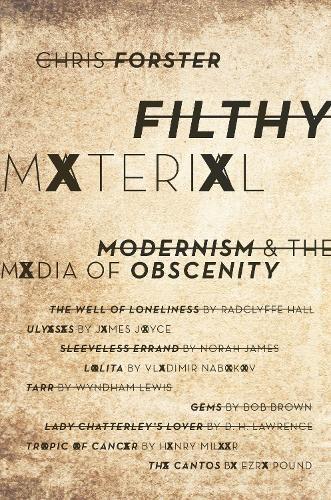Overview
Modernist literature is inextricable from the history of obscenity. The trials of figures like James Joyce, D. H. Lawrence, and Radclyffe Hall loom large in accounts twentieth century literature. Filthy Material: Modernism and The Media of Obscenity reveals the ways that debates about obscenity and literature were shaped by changes in the history of media. Judgments about obscenity, which hinged on understanding how texts were circulated and read, were often proxies for the changing place of literature in an age of new technological media. The emergence of film, photography, and new printing technologies shaped how literary value was understood, altering how obscenity was defined and which texts were considered obscene. Filthy Material rereads the history of obscenity in order to discover a history of technological media behind debates about moral corruption and sexual explicitness. The shift from the intense censorship of the early twentieth century to the effective 'end of obscenity' for literature at the middle of the century, it argues, is not simply a product of cultural liberalization but of a changing media ecology.Filthy Material brings together media theory and archival research to offer a fresh account of modernist obscenity and novel readings of works of modernist literature. It sheds new light on figures at the center of modernism's obscenity trials (such as Joyce and Lawrence), demonstrates the relevance of the discourse obscenity to understanding figures not typically associated with obscenity debates (like T. S. Eliot and Wyndham Lewis), and introduces new figures to our account of modernism (like Norah James and Jack Kahane). It reveals how modernist obscenity reflected a contest over the literary in the face of new media technologies.
Full Product Details
Author: Chris Forster (Assistant Professor of English, Assistant Professor of English, Syracuse University)
Publisher: Oxford University Press Inc
Imprint: Oxford University Press Inc
Dimensions:
Width: 23.60cm
, Height: 1.80cm
, Length: 15.70cm
Weight: 0.454kg
ISBN: 9780190840860
ISBN 10: 0190840862
Pages: 232
Publication Date: 15 November 2018
Audience:
College/higher education
,
Professional and scholarly
,
Tertiary & Higher Education
,
Professional & Vocational
Format: Hardback
Publisher's Status: Active
Availability: To order

Stock availability from the supplier is unknown. We will order it for you and ship this item to you once it is received by us.
Reviews
In Filthy Material, Forster urges us to see the legal, social, and policy controversies around obscenity as proxies for the ever-changing social process of reading and the nature of literature itself. Bringing together ideas from law, literature, visual art, film and much more, this innovative and deftly written book asks us to see modernism not as a foreclosed literary period, but as the herald of our own media-saturated world. In the process, he reveals that the ever-shifting concept of obscenity still secretly shapes our basic definitions of literature and art. --Sean Latham, Walter Endowed Chair of English, University of Tulsa
Highly Recommended. * CHOICE *
In Filthy Material, Forster urges us to see the legal, social, and policy controversies around obscenity as proxies for the ever-changing social process of reading and the nature of literature itself. Bringing together ideas from law, literature, visual art, film and much more, this innovative and deftly written book asks us to see modernism not as a foreclosed literary period, but as the herald of our own media-saturated world. In the process, he reveals that the ever-shifting concept of obscenity still secretly shapes our basic definitions of literature and art. --Sean Latham, Walter Endowed Chair of English, University of Tulsa
Author Information
Chris Forster is Assistant Professor of English at Syracuse University




